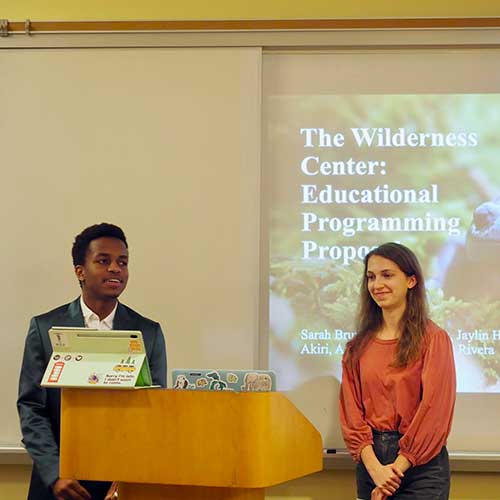
Social Entrepreneurship program students perform local research projects to solve community business problems

The Social Entrepreneurship (SE) program at The College of Wooster once again designed community-based projects that connected talented students seeking experiential learning opportunities with community leaders with real business needs.
For more than 15 years, the program has paired mentored student teams with community organizations to work on social change projects. The 2022 participants served The Wilderness Center (TWC) of Wilmot, Ohio and Pathways to Prosperity, a multi-disciplinary project funded by a USDA grant.
Two interdisciplinary teams worked on projects for TWC, a long-time collaborator with the SE program. TWC Executive Director, Jeanne Gural, said the center was looking at its programs from a cost/benefit structure and addressing increasing costs. It asked Wooster students to benchmark how nature-based education programs are structured and how they are financed.
“In the past TWC was able to offer most of our programming for free or low cost and that simply is no longer the reality,” said Gural. “To create a more financially sustainable future, we needed to reassess and were looking for more information on how other centers have tackled these same issues.”
Iván Akiri ’22, Amanda Iskin ’24, and Giselle Rivera ’24 interviewed eight nature centers from around the country. A second student team comprised of Sarah Brunot ’22, Elizabeth Jha ’24, and Jaylin Hudson ’24 interviewed four nature-based educators and teachers in Northeast Ohio. The students synthesized their extensive interview data, identified key takeaways, and used them to inform their framework for impactful and sustainable nature center educational programming. They presented collective insights in a final report to TWC.
“We are very pleased with the outcome and report,” said Gural. “Our education team and committee are already in discussions on how best to incorporate the ideas on fundings as we move forward with plans for the fall semester.”
Melanie Long, assistant professor of economics and business economics, said one of the highlights of advising the TWC teams was seeing the students develop an understanding of problems that they were previously unfamiliar with—and often learning along with them. “In most cases, our students did not have expertise directly related to the areas of this year’s projects, such as STEM-based nature education or value-added agriculture,” said Long. “Yet by asking great questions and applying frameworks from social entrepreneurship, they gained deep knowledge in these areas.”
Sukriti Chiripal ’24 and Ritwik Jha ’24 partnered on the Pathways to Prosperity project in collaboration with the Ohio Agricultural Research and Development Center (OARDC). Pathways connects rigorous research with extension outreach to strengthen the value-added food and agricultural sector in rural communities.
Amyaz Moledina, associate professor of economics/global and international studies at Wooster, co-founded the SE program. He explained that the main goal of this second project was to reach out to key policymakers and gauge their awareness of the value of agriculture in Wayne and Holmes County.
“This team interviewed nine policymakers including the County Commissioners and the Mayors of Rittman and Orrville,” said Moledina. “The interviews helped to frame the recommendation of a food atlas specifically for value-added agriculture.”
 Matt Mariola, assistant professor of environmental studies, has mentored six local SE student teams, including this one for Pathways to Prosperity. “The way in which the students pull together a real-world, deeply-researched, and fairly comprehensive action plan for a real-world local organization just never ceases to impress,” said Mariola. “There seems to be something about the real-world application, the fact that they are working for a community-based client, that spurs them to produce work that they may not achieve in a more traditional class.”
Matt Mariola, assistant professor of environmental studies, has mentored six local SE student teams, including this one for Pathways to Prosperity. “The way in which the students pull together a real-world, deeply-researched, and fairly comprehensive action plan for a real-world local organization just never ceases to impress,” said Mariola. “There seems to be something about the real-world application, the fact that they are working for a community-based client, that spurs them to produce work that they may not achieve in a more traditional class.”
SE has worked with more than 40 clients since 2006 and provides more than $500,000 in value every year. Many clients proposed new business enterprises that have launched and grown to become important features of the local business ecosystem. Community organizations interested in discussing the possibility of student projects for Spring 2023 can contact Moledina to arrange a consultation meeting.
Picture 1: Iván Akiri ’22 and Sarah Brunot ’22 present their data and insights to The Wilderness Center.
Picture 2: Professor Melanie Long, Giselle Rivera ’24, Elizabeth Jha ’24, Amanda Iskin ’24, Sarah Brunot ’22, Ritwik Jha ’24, Iván Akiri ’22, Jaylin Hudson ’24, Sukriti Chiripal ’24, Professor Matt Mariola, and Professor Amyaz Moledina.
Posted in Experiential Learning, News on June 3, 2022.
Related Posts
Related Areas of Study
Entrepreneurship
Identify opportunities and solutions that have value, then communicate that value to others
PathwayEconomics
Learn how humans organize to sustain life and enhance its quality from a diversity of economic perspectives
Major MinorBusiness Economics
Learn how economics and quantitative methods can be applied to contemporary problems in finance, management, and business with expert faculty mentors in a diverse department
Major

